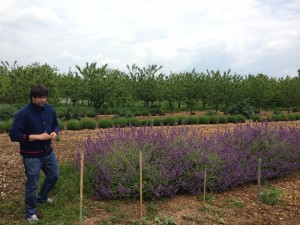Extreme Taste Adventures With Delicate Spirits
I may be incurably afraid of heights and lack the balance for extreme sports, but my taste buds are little daredevils. I get a rush of excitement when I have the opportunity to taste something new and adventurous. So when I found out I was going to be tasting something called “Goutte de Prunelart,” my heart went all a pitter patter.
I had no idea what “goutte” meant, and I vaguely remembered that Prunelart was some sort of rare French wine grape that isn’t grown much anymore. Reading up on it again, I was reminded that it is a distant relative of Malbec, a.k.a. Cot, depending on the context.
Prunelart is among the unusual fruits that are distilled into the exquisite range of eaux de vie and liqueurs made by Laurent Cazottes. These also include Poire Williams, wild sour cherry, wild quince, folle noir grapes, cédrat (a type of citrus), greengage (a.k.a. Reine Claudes, a type of plum) and a rosé made from Mauzac grapes, which are nearly extinct, as well as a liqueur made from 72 varieties of tomatoes. Get your head around that - tomato. Liqueur. With 72 kinds!
‘Goutte,’ by the way, means ‘droplet’ or ‘tear.’ So Goutte de Prunlart translates to Prunelart tears. As though the fruit is crying its own juice rather than having it squeezed from its core. The English language is sorely lacking when it comes to such terms, isn’t it?
Cazottes is a second generation distiller, having taken over his family business in 1998. When his father was producing these products, he outsourced the fruit from other growers. Laurent decided it would be much more authentic to grow them himself, and make sure they are done so biodynamically. He set up his own distillery to produce the spirits in the Tarn region of France (southeast of Bordeaux and northeast of Toulouse). A portion of the grape brandies he distills there also double as a base for his fruit liqueurs.
I had the opportunity to taste the range of these spirits at a magnificent dinner showcasing them at Rouge Tomate in Manhattan. My taste buds very much enjoyed their adventure with these brandies and liqueurs! The fruits are closely monitored for ripeness, then peeled, cut and seeded before being crushed for production, and the meticulous process Cazottes adheres to shows in the final product. Having never tasted many of these fruits in any other form, (it’s not as though I can snack on Mauzacs) obviously I’m unable to evaluate the authenticity of the flavors. However, there is a distinct house style that sets these apart from any other fruit brandies I have tasted, and they can be enjoyed on their own terms.
Many fruit brandies tend to be super concentrated, pummeling the palate with harsh fruitiness, or somewhat medicinal tasting, and not allowing the attributes of their other elements to shine through, and then lashing the throat with an alcoholic finish. They can really only be enjoyed when gussied up into a cocktail, or perhaps, at best, at the end of a drunken meal. The ones from Cazottes are much more delicate - tasting of fruit, but with exotic perfumes and textures to be savored as they do loops around the tongue. Though the brandies are a revved up 90 proof, they go down clean with only a small bite of heat from the alcohol.
That 72 tomato liqueur, by the way? There really is nothing like it. It’s simultaneously savory and sweet, and keeps the palate guessing where to focus, which is part of the fun. Imagine the pleasure of tasting a freshly picked tomato that’s been roasted within a couple of hours of leaving the vine. But there is also a distinct sherried nuttiness, and honeyed sweetness. I either have to drink a lot more of it to be sure how I feel about it, or else maybe try it in a cocktail. I’d love to taste it mixed with a little gin, lemon and an appropriate bitter to draw out the flavor details, something very springy and botanical, like dandelion.
See, already lining up another taste adventure!
Laurent Cazottes eaux de vie and liqueurs are imported in the US by PM Spirits and available at select bars, restaurants and retailers.




